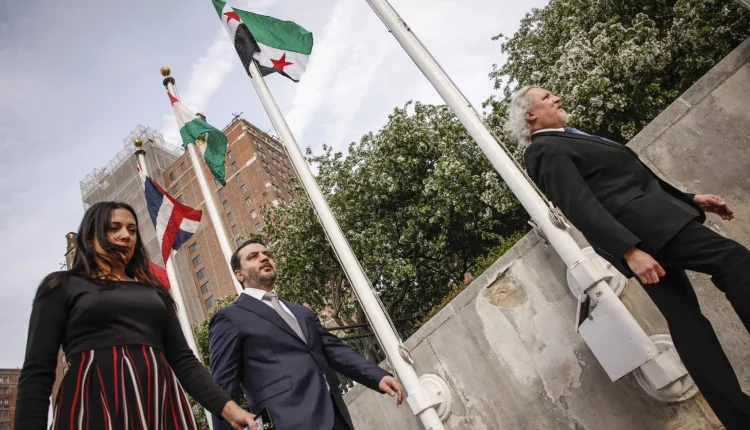Syrian Foreign Minister Al-Shibani Offers Cooperation on Missing Persons at UN
By Kardo Roj
NEW YORK, U. S. (North Press) – In a historic moment for Syria’s re-engagement on the global stage, Foreign Minister Asad al-Shibani addressed the United Nations Security Council on Friday, offering to cooperate with the United States on resolving the issue of missing persons. This marked Syria’s first official participation at the UN in years, signaling a potential shift in the country’s diplomatic trajectory.
Earlier in the day, al-Shibani raised the new Syrian flag outside the UN building in New York, an act that he described as a symbol of Syria’s commitment to a new chapter of engagement with the international community. During his speech, he reaffirmed Syria’s readiness to work with the United States and other international stakeholders to address the complex issue of individuals missing in the wake of the country’s decade-long conflict.
Al-Shibani’s comments came as part of a broader effort to reassert Syria’s sovereignty and re-engage with the international community following years of isolation. The Foreign Minister acknowledged the history of division within Syria, particularly under the rule of President Bashar al-Assad, but insisted that the country was now unified under a new government framework.
“We are prepared to cooperate with every country, including the United States, to address the issue of missing persons,” al-Shibani stated. “Syria is now committed to resolving the long-standing problem of the disappeared and ensuring justice for the victims of the past.”
Al-Shibani also reiterated the government’s commitment to fighting terrorism, claiming that Syria has successfully unified various military factions under one banner in its battle against groups such as the Islamic State (ISIS). He emphasized that the country was now poised to collaborate with the global community to confront ongoing security threats.
While al-Shibani’s speech highlighted Syria’s intentions for cooperation, he also took the opportunity to criticize the previous Syrian regime under Bashar al-Assad. He described the pre-2011 period as one in which Syria became a “haven for foreign militias and drug cartels” and underlined the negative consequences of Assad’s policies, which he argued deepened the country’s divisions and exacerbated the suffering of the Syrian people.
“We have moved beyond the era of systematic killings and human rights violations,” al-Shibani declared, stressing that a new Syria was emerging under his leadership. He also mentioned the upcoming establishment of a transitional justice body and a committee dedicated to investigating the fate of missing Syrians, signaling a potential shift toward addressing accountability for past abuses.
Al-Shibani concluded his remarks by calling for the immediate lifting of international sanctions, which he described as a significant barrier to Syria’s recovery. “The lifting of sanctions is a crucial step in transforming Syria into an active partner in international development and prosperity,” he argued. The Foreign Minister’s appeal reflects the ongoing debate over the effectiveness of sanctions and their impact on Syria’s post-conflict reconstruction.
The Syrian government’s new diplomatic posture, embodied in al-Shibani’s speech, indicates an interest in re-establishing ties with the West and international organizations. However, it remains to be seen whether this shift will translate into tangible political and security reforms, or whether the country’s complex internal and external challenges will continue to obstruct progress.
Al-Shibani’s appearance at the UN marks a crucial moment in Syria’s ongoing political and diplomatic evolution. While his comments signal an openness to engage with global partners, the country’s path to re-establishing its full international standing will depend on its ability to address lingering issues such as the fate of missing persons, human rights abuses, and its role in the broader Middle East.
For Syria’s neighbors, particularly those in the region’s more unstable zones, such as northeast Syria, al-Shibani’s remarks could signal a potential shift in regional dynamics. The long-term stability of Syria and its neighbors will depend on the cooperation—or lack thereof—between the new Syrian government and international actors.
As Syria steps into this new phase of diplomacy, much remains uncertain. The coming months will reveal whether this newfound rhetoric can lead to substantive change on the ground or whether it will face resistance from entrenched interests both within Syria and abroad.

